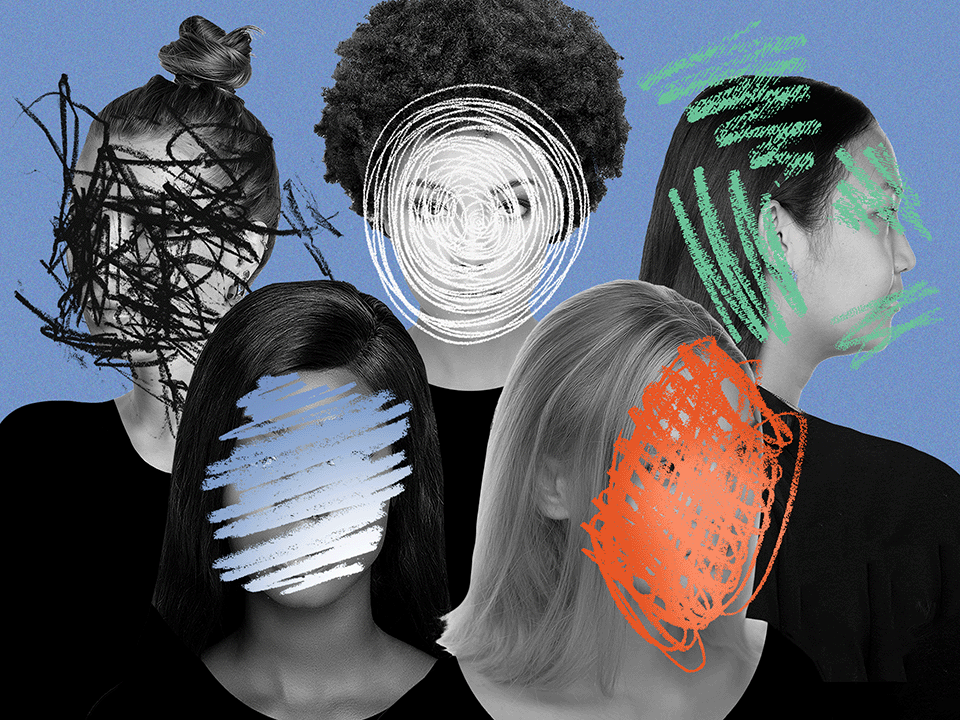Abortion Restrictions Are a Mental Health Issue
There's never been a more stressful time to get pregnant in America.
Just before the sunrise on what would become a balmy February day in Florida, Anya Cook shot off a text to three of her close friends. “I’m not OK,” it read. Cook had never written anything that vulnerable before. She was typically the cheerleading, “positive” force in the group; the one offering mentorship and support. Now, she was the one asking for help.
In the hours before sending that message, Cook was experiencing suicidal ideation. She felt a deep darkness, one that had been washing over her since mid-December 2022.
Earlier that fall, she was thrilled to find out she was pregnant after a round of IVF and multiple miscarriages. Of course, she was nervous about what could go wrong. At that point, she knew she was having a girl and even picked a nickname: Bunny. Things were moving along fine, until the day Cook’s water broke at the beginning of her second trimester. She was in trouble.
Her doctor told her she was experiencing preterm premature rupture of the membranes (PPROM), which can cause life-threatening complications, and, in her case, there was “no chance” the fetus would survive, Cook says.
Before June of 2022, many doctors would’ve offered to help a patient in this heartbreaking situation end their pregnancy to reduce the risk of life-threatening complications such as hemorrhaging, infection, or sepsis. “Once it has been determined that a pregnancy, in general, is not going to be viable, it would be a very important part of the standard of care to offer ending the pregnancy,” says Sarah K. Horvath, MD, OB-GYN and assistant professor of obstetrics and gynecology at Penn State Hershey Medical Center, who was not involved in Cook’s case.
But, in the wake of the Supreme Court ruling known as Dobbs v. Jackson Women's Health Organization, the one that reversed Roe v. Wade and nearly 50 years of precedent protecting the right to an abortion, Florida’s 15-week abortion ban was in effect. Cook was 15 weeks and six days into her pregnancy. She missed the cut off.
Cook was sent home, and, less than 12 hours later, delivered a stillborn in the bathroom of a hair salon. She was rushed to a nearby hospital where she nearly died after losing about half the blood in her body—a complication that almost certainly would have been less traumatic and severe had she been able to medically terminate the pregnancy when she was told the pregnancy wasn't viable the night before. Then, she would have been surrounded by doctors who could quickly work to stop the bleeding, not at a salon, Dr. Horvath adds.
As Cook began to recover from the physical effects of the life-threatening emergency and subsequent surgeries, her mental health took a “downward spiral” over the next couple of months. Thankfully, her friends encouraged her to seek help immediately after they received Cook’s message—and she did.
Though she’s doing OK after experiencing that intense physical, mental, and emotional trauma, it’s obvious the Dobbs-era medical system failed Cook. First, it came for her physical health—and the mental health repercussions threatened her life again.
How we got here
In 1973, the Supreme Court ruled in Roe v. Wade that people who could get pregnant had a constitutional right to an abortion in the U.S. But state lawmakers continued to challenge that ruling by passing restrictions that made it harder to get an abortion. In turn, abortion rights groups challenged those laws by filing suits against them, claiming they contradicted the precedent set by Roe. Over the course of 40 years, the Supreme Court of the United States repeatedly enabled restrictions on abortion care, slowly chipping away at the precedent set in the ’70s. Then, last summer, the Supreme Court’s Dobbs ruling fully overturned Roe, enabling states to ban abortion for any reason.
And many states did just that—passing restrictive laws that make it impossible to access an abortion from an in-state provider. Terminating a pregnancy in those states now requires traveling somewhere it’s legal (which some states are beginning to crack down on) or seeking out a self-managed medication abortion (which, though safe, is legally risky in some areas, like Nebraska*).
One year later, scenes like Cook’s are playing out across the country, making it arguably one of the scariest times to be pregnant in the U.S.
How abortion restrictions impact your mental health
Whether you want to be pregnant or not, the fact that restrictive abortion laws could impact the care you receive is unsettling, especially since pregnancy has always been a health risk. ICYMI, the maternal mortality rate in the U.S. currently stands at 32.9 deaths per 100,000 live births (for Black women, that jumps to 69.9), per a recent report from the Centers for Disease Control and Prevention (CDC). The average rate in countries with similar income levels is 12, according to World Health Organization data from 2020. What's more, the maternal mortality rate is higher (and has been increasing more rapidly) in states with abortion restrictions than it is in states with more abortion access, according to a report by the Commonwealth Fund analyzing data from 2018 to 2020.
Those stats are stressful, scary, and infuriating in any context. But in the post-Roe era we’re currently living in, when your access to potentially life-saving abortion care is not guaranteed, this reality is bound to make a dent in your mental well-being, explains clinical psychologist Julie Bindeman, PsyD, who specializes in treating clients experiencing reproductive health issues. “These laws put us up against our hardwired survival instincts, and it makes people feel desperate,” adds Dr. Bindeman.
Feeling like you have no control over your physical well-being causes stress, which can sometimes become a chronic issue, says Wondermind Advisory Committee member Minaa B., LMSW, author of Owning Our Struggles. If that happens, she explains, “[It] can cause nervous system dysregulation and impact a person's overall mental health and quality of life.” The longer you’re in this state of heightened stress, the higher your chance of mental health issues like anxiety, depression, or ongoing PTSD, says Minaa B.
For many people, mental health issues are already part of the pregnancy journey—even in very wanted pregnancies. Between 10-20% of pregnant people experience peripartum depression, a review of research published in 2022 suggests, and peripartum anxiety disorders happen in up to 15.8% of pregnant people, per a much smaller study from 2016. Not knowing how abortion limits or total bans could impact your care can just exacerbate those symptoms, says therapist Nicole Lewis, LCSW, who works with clients in Mississippi and Alabama, where severe abortion restrictions exist.
When the Dobbs decision was first announced last year, Cook worried it would impact future pregnancies or her in vitro fertilization (IVF) treatments, but now the stakes feel even higher. “These laws affected me in such a dramatic way that I never could have imagined in June 2022,” Cook says. “Now, I feel that getting pregnant is basically a death sentence because you don't know the day that you get pregnant that you'll make it to 40 weeks. Nobody knows that.”
Unsurprisingly, data shows that an unwanted pregnancy is associated with its own set of mental health consequences. One review of research out last year found that people who didn’t want to be pregnant were more at risk for depression during pregnancy and postpartum than those who did. In another review from 2016, the authors found the same, plus an increased risk of perinatal anxiety, which makes sense.
We also have research suggesting that being forced to carry out a pregnancy after being denied an abortion can impact your mental health in multiple ways. In one long-term study, the first of its kind, researchers interviewed more than 900 women across the U.S. who received an abortion or couldn’t get one. They found that those who were denied had lower self-esteem, less life satisfaction, and more anxiety than those who got the procedure. On the flip side, the most common emotion people felt after having an abortion was relief, says M. Antonia Biggs, PhD, who’s one of the original researchers of that study and an associate professor and social psychologist at University of California San Francisco.
There’s also a sense of dysphoria, or a disconnection and dissatisfaction within one’s self, that can come with carrying a pregnancy you don’t want or that isn’t medically viable, explains Dr. Bindeman. That can make going out in public—where it’s normal for strangers to casually drop a, “Congrats!”—emotionally taxing. In Dr. Bindeman’s experience, people in those situations tend to avoid going out as much as possible, yet another side effect with potential mental health consequences.
For those who can’t get an abortion, the ripple effect of following through with an unwanted pregnancy (which might include things like money issues, rethinking life goals or priorities, or even staying with an abusive partner) can also cause emotional harm. When the Texas Senate Bill 8 abortion ban went into effect in 2021 (which criminalized abortion after six weeks except when the pregnant person’s life is in danger), Bhavik Kumar, MD, medical director of primary and trans care at Planned Parenthood Gulf Coast, remembers working with a patient who was showing all the signs of someone experiencing domestic abuse. After the patient’s ultrasound, he realized she was just a little too far along to receive an abortion in Texas.
“Receiving that information was understandably devastating [for her],” he remembers. “I know that, based on my training, within a matter of minutes, I could have helped her be one step closer to getting away from her abusive partner.” But because of the laws, there was nothing he could do beyond sharing information and resources to access care out of state.
For Mady, a 23-year-old who also had to work around that Texas abortion ban, the emotional toll of turning her life upside down to access an out-of-state abortion two years ago still lingers. After missing work and dropping a college class to commute to Mississippi—twice—she got the medical procedure she couldn’t access in her home state.
Mady’s family and friends helped her through, but a lot of folks close to her weren’t entirely sure how to be supportive. Going to therapy helped her process, she explains. Today, she’s thankful for the abortion but also enraged about the lengths it took and the fact that more people are now experiencing what she went through.
Based on her previous studies, Dr. Biggs suspects that the Dobbs decision will likely increase anxiety or other mental health issues for the growing number of people who want an abortion but can’t get one. “Now that there are more states banning abortion, more people will need to overcome a myriad of emotional, informational, and logistical challenges to access care and will experience reduced privacy in the decision,” she explains. Because of that, many won’t be able to get one at all.
And, due to long-standing structural racism and healthcare inequities, low-income communities and people of color will be most impacted, says Dr. Biggs. It’s likely they already are.
A maternal mental health crisis on steroids
If all of that seems like a LOT, that’s because it is, and it’s adding to a maternal mental health emergency that’s been happening for a while now. A report published by the CDC last year looked at data from 1,018 pregnancy-related deaths from 2017 to 2019 in 36 states and found that 23% stemmed from mental health conditions (and let’s keep in mind that was before the pandemic made everything a lot more stressful).
In May 2022, the department of Health and Human Services (HHS) launched the Maternal Mental Health Hotline (1-833-852-6262) for pregnant or postpartum people to call for support. During the first year, the hotline received roughly 12,000 calls and texts, most of which came from people feeling depressed, anxious, or overwhelmed, according to the HHS.
All of these stats basically translate to one big issue: People who are pregnant or postpartum, whether they want to be or not, need mental health care—and they’re not getting it. And as you might have guessed, our health care and mental health care systems are a big part of the problem. A 2023 report graded all 50 states on whether they had the providers, programs, screenings, and insurance coverage that could boost maternal mental health, and only one state got above a C+ (California). A whopping 40 states failed.
In the wake of the Dobbs decision, given all of the ways an unwanted pregnancy impacts a person’s well-being, that crisis is even more dire. In an article published in the journal Frontiers in Psychiatry, mental health and medical pros predict that as more people are denied abortion care, the demand for mental health help during and after pregnancy will keep rising, and those who are most at risk will continue to miss out on the care they need and deserve.
How to cope with all of this
Not gonna lie, it makes sense if you’re feeling completely hopeless and full of existential dread. We hear you. While the onus shouldn’t be on you to fix this effed system, here are some ways to deal with the current state of this mess.
1. Take care of yourself.
Start with the basics: Have you sipped some water today (in addition to those infinity cups of coffee), did you take your mental health meds, are you able to get outside or at least in front of a window? Doing little things like these can help you feel more grounded in general and when you’re stressed.
If you’re a person who can get pregnant, taking care of yourself in these post-Roe times can also mean making sure you’re on a form of birth control you can rely on. Coming up with an in-case-of-emergency plan can help too, says Lewis. Taking actionable steps, like stocking up on emergency contraceptives or abortion pills (if possible), setting aside some money to use for abortion travel (again, if possible), and making a list of abortion funds and nearby clinics can reduce your anxiety. All this can help you feel like you’re more in the driver’s seat, Lewis says.
2. Talk to your people.
Being open with those you trust, like your friends, your partner, or your family (if that feels safe for you), is another great way to manage the fear, anxiety, and hopelessness of these times, says Minaa B. Talking it out can validate your fears and grief, especially when you share them with someone who feels the same way. “It helps us to understand that we're not the only people who feel concerned or sad,” she adds.
Telling those same people (or anyone else who feels trustworthy) that you’d be there for them if they needed an abortion is another solid way to reduce the mental load of these restrictions. Research suggests that people who sought an abortion (whether they got one or not) but weren’t supported by one or more people had more depression and stress symptoms than those who felt “very much” supported. So, yeah, making yourself available can make a difference.
3. Help people outside of your circle.
Showing up for yourself and your crew is so, so important. But there’s a lot of good you can do for others who really need resources to access abortion care. Donating to local and national abortion funds like the National Network of Abortion Funds (if you can), joining local activist groups, and encouraging your friends, fam, and social media followers to do the same can help you feel empowered in the face of this giant mess, says Dr. Bindeman.
4. Rest.
Honestly, it’s fine to take a break from the news or activism work, says Dr. Bindeman. When you’re just too damn exhausted, use that time to do something that helps you recharge, even if that means doing absolutely nothing, so you can get back to your regularly scheduled change-making.
*For more info on the legality of self-managed abortions in your state, check out If/When/How’s Repro Legal Helpline or We Testify’s guide. You can also find more clinician-backed information and resources about self-managed abortion care at M+A Hotline.
Wondermind does not provide medical advice, diagnosis, or treatment. Any information published on this website or by this brand is not intended as a replacement for medical advice. Always consult a qualified health or mental health professional with any questions or concerns about your mental health.




